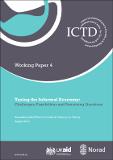Taxing the Informal Economy: Challenges, Possibilities and Remaining Questions

Download
Date
2012-08Author
Joshi, Anuradha
Prichard, Wilson
Heady, Christopher
Metadata
Show full item recordImpact
Abstract
Recent years have witnessed significantly increased attention to the challenge of taxing small
businesses in the informal sector. However, much of this recent attention has remained focused
on comparatively technical issues of revenue maximisation and policy design. This paper argues
that this debate should focus increasingly on the wider development implications of informal
sector taxation, as well as the political and institutional barriers to improved performance.
When considering the merits of committing scarce resources to taxing small informal sector
firms, debate has frequently focused on limited revenue potential, high costs of collection and
potentially perverse impacts on small firms. By contrast, recent arguments have increasingly
emphasised more indirect benefits of informal taxation in relation to economic growth, tax
compliance and governance. These potentially broader benefits are increasingly finding support
in recent research, but they are contingent on government support and consequently demand
further attention.
When we turn our attention away from whether tax authorities should tax small informal
businesses towards the challenge of how to do so more effectively, we again argue that a
broader frame of analysis is needed. Most existing research has focused on developing less
distortionary tax regimes and on tax simplification in order to reduce the costs of compliance.
However, while important, there strategies remain too narrow. Encouraging tax compliance
demands not only lowering costs but also strengthening the potential benefits of formalisation,
from increased security to new economic opportunities. As importantly, successful reform needs
political support from political leaders, tax administrators and taxpayers alike. This demands
greater attention to strengthening political incentives for reform, through strategic policy,
administrative and institutional reform. With this in mind, the paper highlights a number of recent
experiences that have sought to address these challenges, but which need further study.
